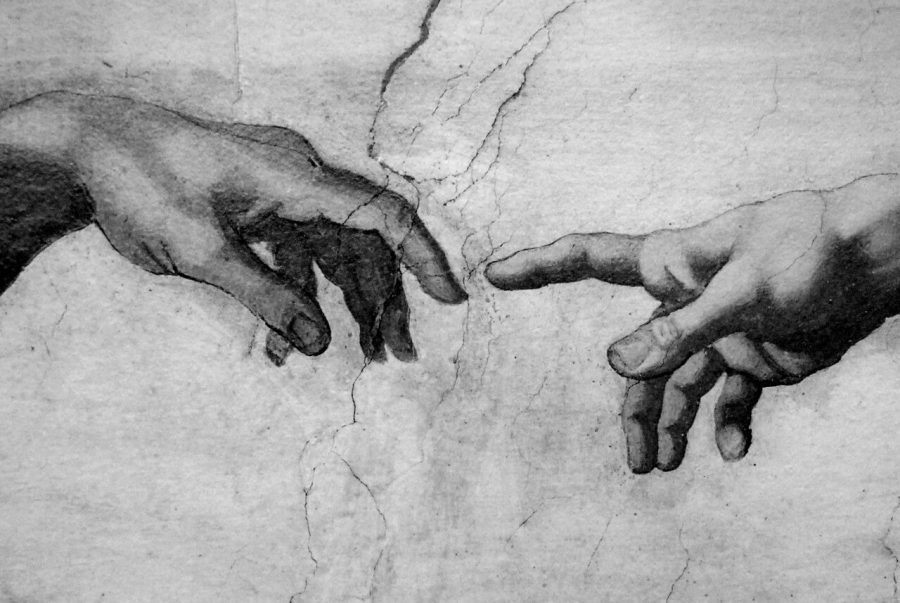Religion: A Hollow Ball For An Important Socket
The Creation of Adam is a symbolic art piece of Catholicism.
September 22, 2021
A recent article I read in my theology class resurfaced many of my looming concerns with the state of reason as it relates to religion. Let’s briefly summarize the article for those who haven’t read it before I give my two cents. In Alice McDermott’s, “Confessions of a Reluctant Catholic,” she details her shifting relationship with Catholicism while entwining the importance of fiction writing in her adherence to the faith. Growing up in a traditional Catholic home, she and her brothers later distanced from the church, all for her to later return as an adult. The premise of her current belief can be summarized as follows: Catholicism provides a language for exploring the depths of the human spirit to an extent that pure reason or logic does not. Further, such dialect, alongside church teachings, provides answers and endows meaning on many of life’s most important questions.
As a strong proponent of science and reason, it is always surprising when I read an author who is clearly intelligent, but to some extent still polluted by religious blather. In this particular piece, such examples include McDermott cleverly articulating the importance of writing and the role of fiction, all to be suddenly derailed by a string of phrases proclaiming her belief in Christ and redemption. This dissonance permeates even the highest ranks of society, and never fails to escape serious scrutiny. Take Ben Carson for example. If there was ever a question as to the power of religious myth, one need not look further. He is a neurosurgeon turned politician heralding degrees from Ivy League institutions who publicly proclaims his disbelief in evolution. McDermott does not commit such flagrant errors, but to some degree remains misguided by what I have coined “religious residue,” or the religious teachings that have escaped reason and remain as a framework for steering one’s life.
While McDermott appears self-aware of her relationship to the faith, she continuously credits it with more than is due, particularly as a vehicle for traversing the avenue of existential questions. I will argue how religion is more of a placeholder in this regard in addition to championing the other tools on offer.
If you were to plunge into the archives of intellectual debates posted on YouTube, you’d come across those of renowned Atheists Christopher Hitchens, Sam Harris and Richard Dawkins debating Christian or Muslim scholars. In nearly every instance, the religious opponent resorts to an argument about the usefulness of religion, with the undertone that this, in some way, conveys its truth. McDermott finds herself in this alley in parts of this piece. Consider the following line of phrases quoted directly:
“I began to realize that the language of the church, my church, was not only a means to an end in my fiction but an essential part of my own understanding of the world…. Time and again, I discovered for myself, if not always for my characters, that the promises of my faith, of Christ, gave perfect answers to the questions my own work had raised… I had come to see that the life of Christ, the Son of God… made of our existence a perfect, artistic, whole.”
This excerpt, in the context of the entire piece, is one example of the sudden transitions from objectivity to faith talk and serves as the basis for the analogy that follows. Many yearn for answers to life’s biggest questions and claim that answers to such questions endow meaning in our lives. Religion has happily and uncritically presented itself as the ball to this socket for millennia.
However, other balls exist, and McDermott makes the observation that other religions could very well serve an equal function. We agree on this point. However, the extent to which we view religion as a valid occupant is the subject of our disagreement. Per the title, consider the following example in which a similarly vacuous ball occupies the socket of meaning and morality. In his Pangburn philosophy debate with Jordan Peterson, Sam Harris invites the audience to consider a world in which he raised his daughter under the idea that Batgirl, her favorite superhero, served a similar function to God. He goes on to say that he could leverage this belief to raise a morally upstanding daughter. After a few laughs, it becomes all too clear how an entirely fictitious framework can operate as a potent placebo. However, this level of effectiveness lends not the slightest credence to the truth of the idea itself, and it is this intellectual misstep that leads many into the abyss of wishful thinking.
What is stopping us from speaking about morality free from the shackles of religion? Is it necessary that I delude my future son or daughter about the holy spirit in order to instill strong values? Absolutely not. Unlike McDermott, who is going to “make the best” of Catholicism as a guiding principle, we must hold ourselves to a higher standard to hurdle these iron-age myths and wield the tools of modernity to the fullest extent.










